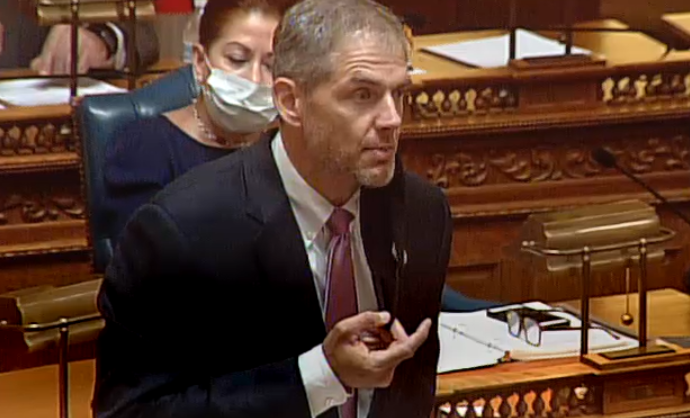
“Bob Menendez used his position as a Senator to line his pockets, apparently quite literally, while doling out political favors,” Dunn (R-Morris) said. “His actions are a disgrace to the esteemed offices he occupied and he should not receive one more tax dollar from the constituents’ whose trust he has finally and completely shattered.”
Elected or appointed officials convicted of crimes involving their government office would forfeit their pension under a bill (A4430) introduced by Dunn. Menendez, who served as mayor of Union City and as a state assemblyman before ascending to Congress in 1993, currently draws a $1,066-per-month state pension, which he has done since 2019, on top of his $139,200 annual salary as Senator.
In July, a jury convicted Menendez on 16 federal charges ranging from bribery, fraud, obstruction and acting as a foreign agent. Federal prosecutors accused him of accepting hundreds of thousands of dollars’ worth of bribes—including cash, a Mercedes-Benz and gold—for political favors. His wife, Nadine, was also charged but had her case indefinitely delayed by the judge.
In response, Democrats, including fellow New Jersey Sen. Cory Booker and Gov. Phil Murphy, called for Menendez’s resignation immediately following his conviction July 16. However, he refused, and instead declared his intent to run as an “independent Democrat” when Congressman Andy Kim secured the Democratic nomination for his seat in the June primaries.
The beleaguered Senator abandoned that reelection bid by mid-August, replaced in the interim by Murphy’s former chief of staff George Helmy. Under the Honest Leadership and Open Government Act of 2007—a bill he voted for—Menendez will lose his federal pension.
“In his pursuit of corrupt power and wealth, he forfeited it all, including his legacy,” Dunn said. “No one who abuses his or her office in such a way should ever expect to receive benefits for a service which is marred by criminal acts.”
Menendez will be sentenced Oct. 29.
# # #
According to a recent report by Insider NJ, former New Jersey Senator Robert Menendez may be required to forfeit his state pension as a result of his conviction on federal corruption charges. The report states that New Jersey State Treasurer Elizabeth Maher Muoio has determined that Menendez’s conviction falls under the state’s pension forfeiture law, which requires public officials convicted of certain crimes to forfeit their pensions.
The decision comes after Menendez was found guilty in 2018 of accepting gifts and campaign contributions from a wealthy donor in exchange for political favors. Despite his conviction, Menendez has continued to receive his state pension, which reportedly amounts to over $105,000 per year.
In a statement to Insider NJ, State Treasurer Muoio explained that the decision to require Menendez to forfeit his pension was based on a review of the state’s pension forfeiture law and the specific circumstances of Menendez’s conviction. She emphasized that the law is intended to ensure that public officials who engage in corrupt behavior are held accountable and do not benefit financially from their actions.
Menendez’s legal team has reportedly indicated that they plan to challenge the decision, arguing that the pension forfeiture law is overly broad and should not apply in this case. However, legal experts have suggested that Menendez may face an uphill battle in overturning the decision, given the seriousness of his conviction and the public interest in holding corrupt officials accountable.
The potential forfeiture of Menendez’s state pension has sparked debate among New Jersey residents and political observers. Some argue that it is a necessary step to uphold ethical standards in government and send a message that corruption will not be tolerated. Others have raised concerns about the impact on Menendez’s financial security and whether the pension forfeiture law is being applied fairly and consistently.
Regardless of the outcome of any legal challenges, the case serves as a reminder of the importance of transparency and accountability in government. As public officials are entrusted with significant power and responsibility, it is essential that they are held to high ethical standards and held accountable for any wrongdoing. The potential forfeiture of Menendez’s state pension underscores the need for strong oversight and enforcement mechanisms to ensure that public officials act in the best interests of their constituents and uphold the integrity of our democratic institutions.


